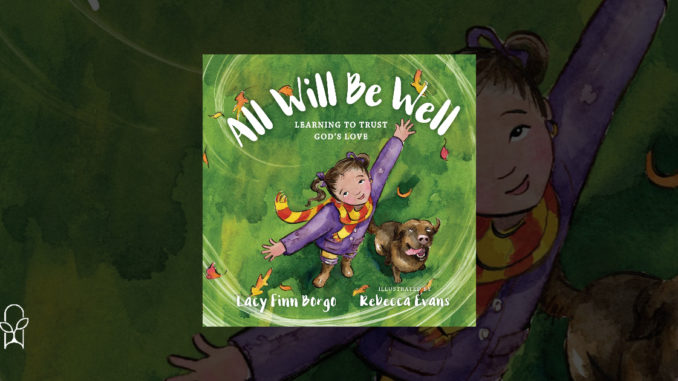
Also by this author: Faith Like a Child: Embracing Our Lives as Children of God, When I Go to Church, I Belong: Finding My Place in God's Family as a Child with Special Needs
Published by IVP Kids on October 4, 2022
Genres: Children's
Buy on Amazon
Goodreads

Then when you don't see me anymore, I will be where God is, said Mima, because God loves you and God loves me, 'All will be well, all will be well, everything will be well.'
Mima is very sick, and just thinking about it makes Julian very sad and very angry. Julian is worried about Mima and wonders if God can hear her or if God cares. So Mima explains to Julian that God loves us and that God can be trusted--even when we are sad or angry. This gentle story of a grandmother's love for her granddaughter incorporates the timeless wisdom of Julian of Norwich: because of God's great love for us, all will be well.
Written by Lacy Finn Borgo and beautifully illustrated by Rebecca Evans, All Will Be Well will be enjoyed by children and the adults who read with them. Also included is a note from the author to encourage further conversation about the content.
Discover IVP Kids and share with children the things that matter to God!
All Will Be Well is a story of learning to trust God’s love in times of loss. Lacy Finn Borgo wraps her story around a quote from Julian of Norwich, a 12th century English mystic whose Revelation of Divine Love is one of the earliest surviving English-language books written by a woman. The quote is simple “All will be well, everything will be well.”
The story is that of a dying grandmother and a young child hurt and confused by the loss. In her final days, Mima teaches young Julian her namesake’s important mantra: “All will be well, everything will be well.” When Mima dies, Julian asks God why he didn’t heal her. In response, she is reminded of this phrase.
I have a lot of conflicting thoughts about this book. It’s well-written, with a gentle tone befitting its subject matter, and wonderfully illustrated. I wonder if it’s trying too hard by directly incorporating Julian of Norwich. All Will Be Well never focuses on that Julian, tells us anything about her, simply ascribes to her this single quote. It comes across to me as a distraction. Could the book have made the same point in virtually the same words without invoking a 12th century mystic? Absolutely. It would have been less distracting and probably just as impactful to have included the quote’s origins in an afterword.
More important than structure, however, is the message of “All will be well, everything will be well.” The point of the quote is that, no matter what pain or loss is endured, Christ will one day redeem all things. That’s an important point, but it must never be used to deny or downplay the very legitimate feelings of grief over loss. Lament is an integral part of Scripture. (There’s a whole book named for it!) Future restoration does not negate current loss. All Will Be Will never explicitly claims this, but it never explicitly says it doesn’t, either. If a book is going to be nuanced enough to invoke a rather obscure (to the majority of Protestant children) 12th century Catholic mystic, then it needs to nuanced enough to hold the goodness of grief alongside the hope of redemption.
